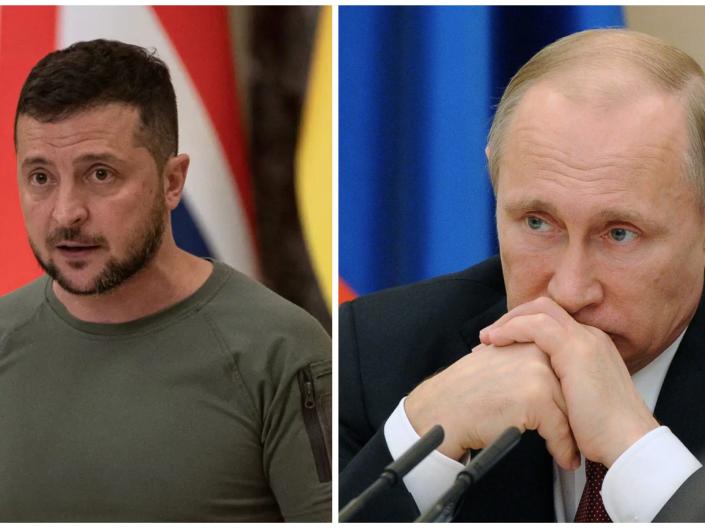In a surprising turn of events, Ukrainian President Volodymyr Zelenskyy announced that five previously imprisoned Azov battalion commanders have returned from Turkey. The commanders had been captured in the port city of Mariupol during the intense battle between Russian and Ukrainian forces. The Ukrainian president shared a video on Saturday showing the commanding members of the battalion hugging him before boarding a plane back home.
However, Russia has accused Turkey of violating an agreement that stated the prisoners would remain in the country until the end of the war. Kremlin spokesperson Dmitry Peskov stated that Turkey was supposed to keep the prisoners according to an agreement forged between Russia, Ukraine, and Turkey. Peskov’s comments came after Turkish President Recep Tayyip Erdogan announced that he would be hosting Russian President Vladimir Putin to discuss the exporting of Ukrainian grain during the ongoing conflict.
Russian forces had captured hundreds of Ukrainian fighters during the three-month battle in Mariupol, with many of them being Azov battalion members who had held the line by hiding in bunkers and tunnels under the Azovstal steel plant. In September, a prisoner swap organized with the help of Turkey and Saudi Arabia allowed hundreds of Ukrainian soldiers to return home. As part of the agreement, it was stated that the five commanders of the Azov battalion who led the charge in Mariupol would remain in Turkey until the war concluded. However, Zelenskyy did not disclose what conditions changed that allowed him to bring the commanders back home.
Meanwhile, 22 other Azov soldiers captured in Mariupol are currently facing trial in Russia after the country designated the battalion as a terrorist group. Human Rights Watch has criticized the proceedings, stating that the trial violates the Geneva Convention on the Treatment of Prisoners of War.
Spokespersons for Zelenskyy, Erdogan, and Putin have not yet responded to requests for comment on the matter. The situation has caused confusion and raised questions about the agreement between Russia, Ukraine, and Turkey, as well as the ongoing conflict in the region.

How did the imprisoned Azov battalion commanders manage to return to Ukraine from Turkey?
In a shocking twist, Ukrainian President Volodymyr Zelenskyy has revealed that five imprisoned Azov battalion commanders have unexpectedly returned from Turkey. These commanders were previously captured during a fierce battle between Russian and Ukrainian forces in the port city of Mariupol. Zelenskyy took to social media to share a video of the commanders hugging him before boarding a plane back to their homeland.
However, Russia has accused Turkey of violating an agreement that stipulated the prisoners would remain in the country until the end of the war. Dmitry Peskov, the Kremlin spokesperson, insisted that Turkey had a responsibility to keep the prisoners in accordance with the agreement reached between Russia, Ukraine, and Turkey. Peskov’s remarks came after Turkish President Recep Tayyip Erdogan announced that he would be meeting with Russian President Vladimir Putin to discuss the exportation of Ukrainian grain during the ongoing conflict.
During the three-month battle in Mariupol, Russian forces had captured numerous Ukrainian fighters, with a significant number of them belonging to the Azov battalion. These brave soldiers had held the frontlines by seeking refuge in bunkers and tunnels beneath the Azovstal steel plant. A prisoner exchange was orchestrated in September with the assistance of Turkey and Saudi Arabia, allowing hundreds of Ukrainian soldiers to finally return home. However, it was agreed that the five Azov battalion commanders, who led the charge in Mariupol, would stay in Turkey until the conclusion of the war. Zelenskyy did not disclose what circumstances led to their return to Ukraine.
In a distressing turn of events, 22 other Azov soldiers captured in Mariupol are now facing trial in Russia after the country labeled the battalion as a terrorist organization. Human Rights Watch has strongly criticized the trial, contending that it violates the Geneva Convention on the Treatment of Prisoners of War.
As of now, representatives for Zelenskyy, Erdogan, and Putin have yet to comment on the matter, leaving many perplexed and raising concerns about the agreement between Russia, Ukraine, and Turkey, as well as the ongoing conflict in the region.

This article sheds light on a pressing issue surrounding the return of Ukrainian soldiers from Turkey, raising pertinent questions about agreements. It highlights the controversy surrounding the matter and prompts us to question the effectiveness and transparency of such agreements.
This article sheds light on the controversial return of Ukrainian soldiers from Turkey, prompting questions about the nature of agreements. An insightful read revealing the complexities surrounding international military collaborations.